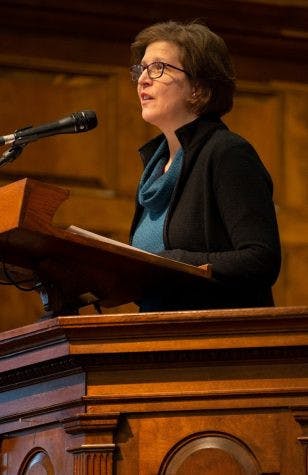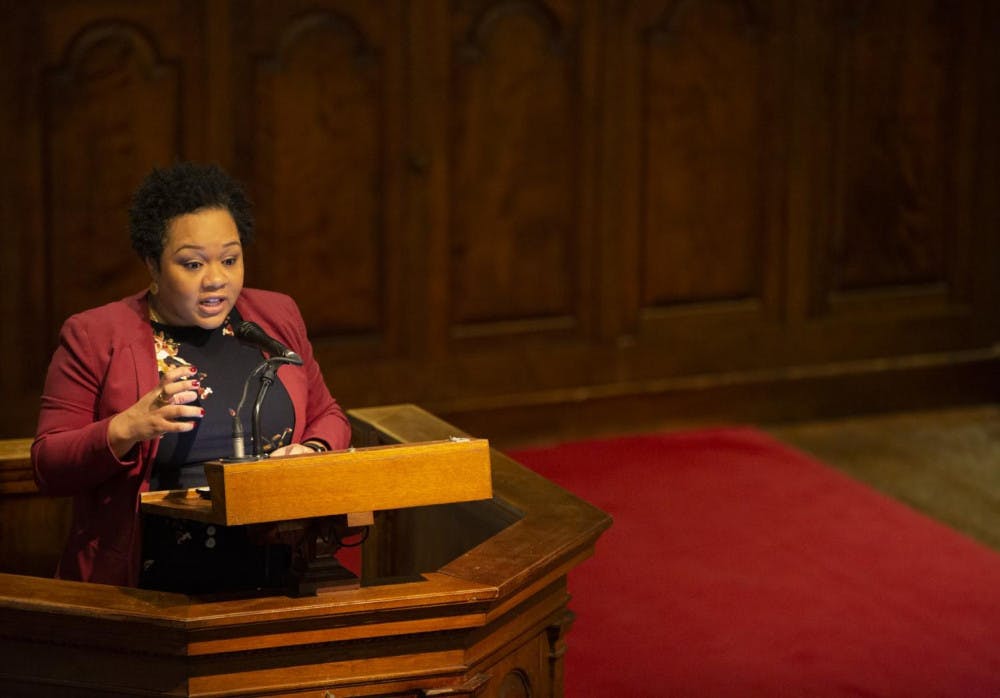Yamiche Alcindor found her purpose as a high school student when she heard a Kanye West song that referenced Emmett Till, a young black boy who was lynched in Mississippi in 1955.
“I had this burning desire to cover more of the Emmett Tills that are out there,” Alcindor, the White House correspondent for PBS NewsHour, said in her Feb. 22 lecture in Mead Chapel. “I wanted to tell stories about people who needed to have their voices heard.”
Alcindor’s aspiration to be on the frontlines of stories like Till’s and contribute to the nation’s collective consciousness catalyzed her early career as a journalist. At her lecture, entitled “My Journey through Journalism,” Alcindor spoke about her career path as well as the purposes and principles that have guided her throughout her “journey.”

Amy Morsman, Professor of History and Interim Dean for Faculty Development & Research, introduced Alcindor.
The talk was part of the Robert W. van de Velde ‘75 lecture series. According to Professor of History and Interim Dean for Faculty Development and Research Amy Morsman, who introduced Alcindor, the lecture series was established in 1981 to honor van de Velde, a Middlebury student who was active in WRMC radio during college and worked in broadcast radio after graduating.
“The van de Velde lecture is all about bringing people to campus who can address questions of public policy and the press,” Morsman told The Campus. “I wanted to bring somebody who was young, and dynamic, and I knew it would be fascinating to get somebody who could talk about their work in the White House every day.”
Alcindor often reports stories about civil rights injustices and police violence. As a student at Georgetown University, Alcindor studied English, government and African American studies. She frequently assured her parents, who are Haitian-American immigrants, that she would be going to law school so that they “wouldn’t ask too many questions.” Meanwhile, Alcindor prepared herself for a career in journalism.
When she started out as an intern, she knew she had to pay her dues, covering stories about puppies, snow and dead whales.
“If you really want to do something, go after it with a fervor and a passion that makes people step back and say, ‘This person really wants it this much, I can maybe respect their ideas,’ ” she said. “If you have an opportunity, you should grab onto those opportunities.”
She was soon hired by USA Today to cover national breaking news, writing stories about the protests in Ferguson, Missouri and the Sandy Hook school shooting. Later, she was approached by The New York Times to cover the presidential campaigns of Donald Trump and Bernie Sanders.
Now, Alcindor covers Trump’s presidency for PBS NewsHour and is a contributor to NBC News and MSNBC.
As a journalist, Alcindor has a history of asking tough questions. Early in her career as a local reporter for Newsday, a publication based in New York, she wrote an article about a city council ordinance that allowed a councilman to get permanent life insurance, costing taxpayers millions of dollars. When covering Bernie Sanders, she questioned the lack of diversity on his campaign.
In November, while reporting for PBS, Alcindor asked the president at a press conference if he felt his rhetoric emboldened white nationalists. He responded by accusing her of asking a racist question.
As Alcindor grappled with this now-infamous interaction with the president, she found stability in the people who stood behind her, and in those she was asking the questions for.
“I focused on my purpose,” she said describing how she grappled with the interaction. “I was steadied by the people who brought me to the United States so I could even ask that question,” Alcindor said.
“That’s going to be a moment that’s replicated for everyone else in this room” she said. “You want to be ready for it, and you want to be strong. Because it will change you, and it will define you. I’m now known as ‘the girl who Trump called racist.’”
Alcindor carries the stories of the people she has met with her. She told the crowd that politicians should be made to answer tough questions and held accountable for their beliefs. People who have platforms should understand what they believe in, and stick to that platform and purpose, Alcindor said.
“What I’ve learned is that you should really stand for something. Journalism must be the medium within which we dig and ask questions, and ask those questions in a more complex way. And we shouldn’t be afraid to push candidates. So in 2020, get ready to see me on stage asking all sorts of questions that make people uncomfortable.”
After the lecture, Middlebury student Ruhamah Weil ’21 reflected on the importance of Alcindor’s talk.
“Right now at Middlebury and in the country at large, we are dealing with questions like how do you stand behind what you believe in, and what do you believe in, and how do you talk to somebody else who believes in something different than you,” Weil said. “Sometimes I think I want journalists to convince people that have other opinions than me that my opinion is right. But I think (Alcindor) reminded me that that’s not always the point of journalism.”
Yamiche Alcindor Recounts a Career of Asking Tough Questions

REID SMITH/THE MIDDLEBURY CAMPUS
Comments



